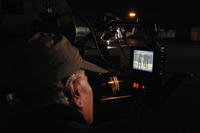The difficulty of scanning for liquid bombs makes detection and early intervention of terrorist networks even more urgent. Lucky for us, British intel agency MI5 was on top of its game, The Scotsman reports:
Based on the information from Pakistan, MI5 began its watching operation last year. The BBC last night reported the operation began in July, but The Scotsman understands it started several months earlier.
In the initial stages, counter-terrorism officers watched from a distance. By sifting telephone records, e-mails and bank records, the MI5 officers built up what insiders call "concentric circles" of information, gradually connecting each suspect to others and building up a detailed picture of the conspiracy.
 Score one for Big Brother.
Score one for Big Brother.In an excellent piece in the August Popular Science, Defense Tech daddy Noah Shachtman shines a light on the kinds of data-mining MI5 and U.S. agencies use to bust terrorists ... and to keep tabs on us:
Whos the most important player in a group? Whos merely peripheral? Data crunchers find out by plotting people as nodes on computerized graphs, forming web-like networks. The links between nodes are then weighed and analyzed using matrix algebra and other tools.
Valdis Krebs digs into a legal alternative to data-mining -- so-called "Social Network Analysis" -- in an excellent piece at orgnet.com. His case study is 9/11:
Early in 2000, the CIA was informed of two terrorist suspects linked to al-Qaeda. Nawaf Alhazmi and Khalid Almihdhar were photographed attending a meeting of known terrorists in Malaysia. After the meeting they returned to Los Angeles, where they had already set up residence in late 1999.
What do you do with these suspects? Arrest or deport them immediately? No, we need to use them to discover more of the al-Qaeda network. Once suspects have been discovered, we can use their daily activities to uncloak their network. Just like they used our technology against us, we can use their planning process against them. Watch them, and listen to their conversations to see...
--David Axe








